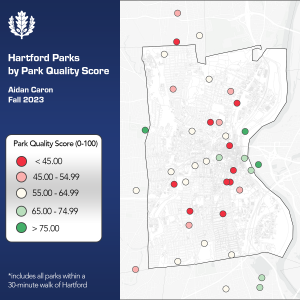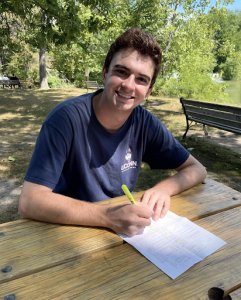Promoting Environmental Justice: A Mixed-Methods Approach to Identifying Socioeconomic Disparities in Urban Park Access & Quality
Fall 2023 UConn Co-op Legacy Fellow – Change Grant Recipient
Project Summary:
Urban communities lacking sufficient access to high-quality parks face limited opportunities to enjoy the health benefits associated with park use. Existing literature seldom employs comprehensive methodologies for quantifying park accessibility and park quality within the same study, with the majority focusing on just one dimension. Using the City of Hartford as a case study region, my project introduces a more nuanced framework for evaluating urban park system equity at municipal and metropolitan scales. I developed a mixed-methods approach that integrates observation-based measures of park quality with a public opinion survey, spatial analysis, and statistical modeling. I found that while demographic composition was unrelated to park proximity, park quality was significantly lower in communities with low educational attainment and more Hispanic residents. Interestingly, a negative linear relationship was observed between median household income and nearby park quality, suggesting that low-income residents have better access to high-quality parks than others. Race variables (African-American and Asian) did not appear to be significantly associated with park access or quality. I plan to investigate these results further and pursue similar lines of research during my doctoral studies.
Project Reflection:
 Parks have always played an important role in my life. Having grown up in a quaint farm town with limited options for entertainment, many of my fondest memories were made amidst the sprawling playsets and pristine athletic facilities of my hometown’s primary community park. As I grew older, my admiration for public green spaces was supplemented by the discovery of an unlikely passion for the sport of disc golf, which led me to explore dozens more community parks across New England and beyond. However, the more parks I visited, the more I began to observe significant disparities in the quality of these spaces. In many cases, where I expected to find vibrant, bustling parks like those of my childhood, I instead discovered trash bins overflowing with empty soda cans and paper bags and overgrown weeds protruding through gaping cracks of concrete basketball courts. The jarring inequities I observed piqued my curiosity and led me to devote my final three semesters as an undergraduate to pursuing a self-designed University Scholar research thesis aimed toward identifying socioeconomic disparities in urban park quality and access. During the summer of 2023, I conducted quality assessments of more than 50 parks in the Hartford area by visiting each site and evaluating them using a detailed rubric. The ‘on-ground experience’ gained from the park audits proved to be invaluable; it introduced a qualitative aspect to the project that painted a more nuanced picture of residents’ lived experiences with parks in their communities. The assessments were also used to generate ‘park quality scores’ for each park in the region. These scores facilitated a regression analysis that explored the relationship between a range of socio-economic factors and the parks’ quality ratings. The site visits also helped me to diversify my own experiences with public parks. I learned that a “perfect park” is not defined by its shape or size, but instead by its ability to foster physical and mental wellness for members of its community.
Parks have always played an important role in my life. Having grown up in a quaint farm town with limited options for entertainment, many of my fondest memories were made amidst the sprawling playsets and pristine athletic facilities of my hometown’s primary community park. As I grew older, my admiration for public green spaces was supplemented by the discovery of an unlikely passion for the sport of disc golf, which led me to explore dozens more community parks across New England and beyond. However, the more parks I visited, the more I began to observe significant disparities in the quality of these spaces. In many cases, where I expected to find vibrant, bustling parks like those of my childhood, I instead discovered trash bins overflowing with empty soda cans and paper bags and overgrown weeds protruding through gaping cracks of concrete basketball courts. The jarring inequities I observed piqued my curiosity and led me to devote my final three semesters as an undergraduate to pursuing a self-designed University Scholar research thesis aimed toward identifying socioeconomic disparities in urban park quality and access. During the summer of 2023, I conducted quality assessments of more than 50 parks in the Hartford area by visiting each site and evaluating them using a detailed rubric. The ‘on-ground experience’ gained from the park audits proved to be invaluable; it introduced a qualitative aspect to the project that painted a more nuanced picture of residents’ lived experiences with parks in their communities. The assessments were also used to generate ‘park quality scores’ for each park in the region. These scores facilitated a regression analysis that explored the relationship between a range of socio-economic factors and the parks’ quality ratings. The site visits also helped me to diversify my own experiences with public parks. I learned that a “perfect park” is not defined by its shape or size, but instead by its ability to foster physical and mental wellness for members of its community.
Change Grant Funding:
I am incredibly grateful to have received project funding from a UConn Co-op Legacy Fellowship Program Change Grant. This funding enabled me to administer an IRB-approved public opinion survey to a national panel of over 400 respondents. The purpose of the survey was to learn more about public park preferences and obtain weights for calculating a park quality score for each site. Respondents felt that park cleanliness and natural aesthetics were the most important facets of park quality. Meanwhile, facets such as recreational amenities (e.g. soccer fields, basketball courts, and playgrounds) and man-made aesthetics (e.g. decorative water fountains and sculptures) were considered to be less important. Thanks to my Change Grant funding, I was able to develop a metric for quantifying park quality that better aligned with the interests and preferences of the general public.
With the recent completion of the project, I have turned my focus to disseminating the results of my project to stimulate broad awareness, government action, and further research. Aside from sharing my research at various university events, I am preparing to present my research to key stakeholders such as the Capitol Region Council of Governments (CRCOG) and the City of Hartford’s Department of Public Works. I am also preparing manuscripts for submission to peer-reviewed journals. Lastly, I plan to share subsequent research stemming from this project at various conferences during my studies as a PhD student. In doing so, I hope to promote environmental justice by improving the equitability of urban park systems.
About Aidan:
Aidan graduated from the University of Connecticut in Spring 2024 with dual B.A. degrees in Geographic Information Science and Political Science. During his tenure at UConn, he was recognized as a University Scholar, served as the Co-Vice President of the Geography Club, contributed as an ORISE Fellow with the U.S. Department of Transportation, and showcased his musical talents as a member of both the UConn Marching Band and Jazz Ensemble. Aidan will pursue his PhD in Geography at Clark University in Worcester, MA beginning this fall. Outside of academics, Aidan enjoys playing saxophone, discovering cool maps, and competing in disc golf tournaments throughout New England!
